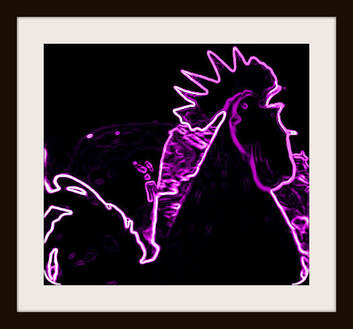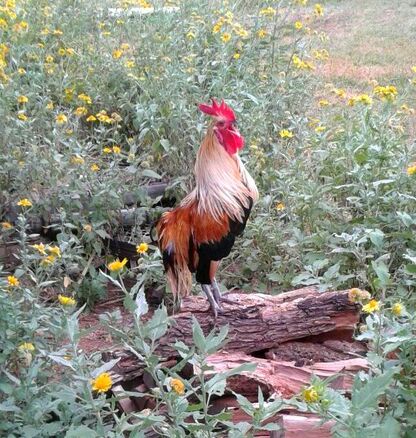Why roosters crow, how crowing is affected by Circadian rhythm and what a roosters crow means.
 Why Roosters Crow. Mr. Buttercup photo courtesy of CHOE
Why Roosters Crow. Mr. Buttercup photo courtesy of CHOE
Roosters crow to tell other birds where their territory is, to protect their hens, to let you know someone is on their property, to warn off other roosters, some crow to call their hens into the coop during late afternoon, and some even crow when they are caught off guard. Roosters crow instinctively. This instinctive desire to crow is caused by something called the circadian rhythm.
To stop a rooster from crowing at the time set by their biological clock is nearly impossible unless you can control the things which trigger their natural instincts.
See our featured video, find out more about what circadian rhythm means, get great deals on poultry supplies, and find out how to caponize a rooster (below).
To stop a rooster from crowing at the time set by their biological clock is nearly impossible unless you can control the things which trigger their natural instincts.
See our featured video, find out more about what circadian rhythm means, get great deals on poultry supplies, and find out how to caponize a rooster (below).
What Circadian Rhythm Means
 Mr. Holly the rooster crowing his little heart out. Rescued from a dog attack and brought to Chicken Heaven On Earth
Mr. Holly the rooster crowing his little heart out. Rescued from a dog attack and brought to Chicken Heaven On Earth
The circadian rhythm is an approximate 24 hour cycle in which living beings (includes plants, animals, fungi, and cyanobacteria) generate activity when prompted by external cues such as sunlight and temperature. This rhythm is shown in brain activity and present in all animals and human beings which stimulates brain wave activity, hormone production, cell regeneration and other biological activities in a 24 hour daily cycle (Science Daily).
This means that a rooster who sees the sun coming up knows instinctively to crow at the break of dawn but studies show that the Circadian rhythm persists even if the rooster does not see the sun come up. Even if kept in complete darkness a rooster instinctively knows what time to crow. The circadian rhythm is different than simple responses to external cues. Studies indicate that this rhythm can be reset by external stimuli. This process is called entrainment. Basically, this means that the Circadian Rhythm that tells the rooster to crow can in fact be changed if you change the external stimuli that incites the crowing.
"The rhythms are entrainable. The rhythm can be reset by exposure to external stimuli (such as light and heat), a process called entrainment. The external stimulus used to entrain a rhythm is called the Zeitgeber, or "time giver". Travel across time zones illustrates the ability of the human biological clock to adjust to the local time; a person will usually experience jet lag before entrainment of their circadian clock has brought it into sync with local time (Wikipedia).
This means it is not impossible to change when a rooster crows but it would be difficult to do. If you take a rooster into a different time zone where morning comes at a different time the roosters biological clock will automatically adjust to the new time zone.
This means that a rooster who sees the sun coming up knows instinctively to crow at the break of dawn but studies show that the Circadian rhythm persists even if the rooster does not see the sun come up. Even if kept in complete darkness a rooster instinctively knows what time to crow. The circadian rhythm is different than simple responses to external cues. Studies indicate that this rhythm can be reset by external stimuli. This process is called entrainment. Basically, this means that the Circadian Rhythm that tells the rooster to crow can in fact be changed if you change the external stimuli that incites the crowing.
"The rhythms are entrainable. The rhythm can be reset by exposure to external stimuli (such as light and heat), a process called entrainment. The external stimulus used to entrain a rhythm is called the Zeitgeber, or "time giver". Travel across time zones illustrates the ability of the human biological clock to adjust to the local time; a person will usually experience jet lag before entrainment of their circadian clock has brought it into sync with local time (Wikipedia).
This means it is not impossible to change when a rooster crows but it would be difficult to do. If you take a rooster into a different time zone where morning comes at a different time the roosters biological clock will automatically adjust to the new time zone.
References:
1. Video: Why do roosters crow. (May 28, 2016). One minute class OMC. https://www.youtube.com/watch?v=D4RfeWvKPB0
2. Circadian rhythms. Retrieved Apr. 13, 2017 from Science daily. https://www.sciencedaily.com/terms/circadian_rhythm.htm
3. Circadian rhythms. Retrieved Apr. 13, 2017 from Wikipedia. https://en.wikipedia.org/wiki/Circadian_rhythm
1. Video: Why do roosters crow. (May 28, 2016). One minute class OMC. https://www.youtube.com/watch?v=D4RfeWvKPB0
2. Circadian rhythms. Retrieved Apr. 13, 2017 from Science daily. https://www.sciencedaily.com/terms/circadian_rhythm.htm
3. Circadian rhythms. Retrieved Apr. 13, 2017 from Wikipedia. https://en.wikipedia.org/wiki/Circadian_rhythm

